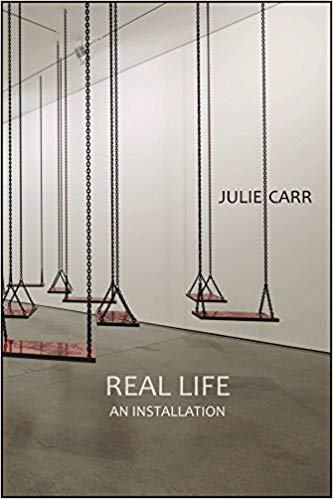 Taking the Temperature
Taking the Temperature
of the 21st Century Climate
6×9 Paperback
232 Pages
Published by Omnidawn, 2018
ISBN-10: 1632430576
ISBN-13: 978-1632430571
Price: $14.62 on Amazon
Review by Emily Vogel
Poetry Editor
T
he immanance of the speaker in Julie Carr’s new collection of poems, “Real Life: An Installation,” resides in a space that juxtaposes a personal drama with the more macrocosmic dramas of the world’s socioeconomic and sociopolitical concerns. Ostensibly, the two dramas parallel each other, and never quite intersect, and yet there are echoes of the personal drama with the “news” of the world, primarily comprised of certain tragedies, whether minor or on more of a grand scale.
The collection presents itself as notably dystopic…it may be suggested by the poems that we are presently living in the end times. In the poem “The Financial Sector” an old man [perhaps] quotes: “Tired of passing through the gloomy frame of history.” This suggests that in the present, or in our experience of the “historical moment” there is a sense of lethargy and hopelessness. As this unveils itself in the first section of the book, the end times implied are defined by the “artifacts” of the contemporary world. In the poem “Dynamic Instability” Carr writes “was it longing for spiritual knowledge to emerge from inside the/machine?”
In our current technological climate, it can be assumed by the masses that our electronics and computers [machines] supersede what has throughout history been recognized as a spiritual or religious God (God the father, Allah, Christ, etc.), and quite clearly have been the predominant momentum of the 21st century. Carr retains these connections to this climate, and largely to the economic concerns which precipitate from the manner in which we live today.
To backtrack, this also related to an earlier poem (which speaks of the dramatic and fictional (or should we conjecture dramatic non-fictional)), “A Short Prose Piece on One of This Book’s Central Themes” she writes of a character named Lucy, who it seems is experiencing molestation, rape, or simply feckless sex, which is indicative of the 21st century “quick fix” sexual act, and which is divested of anything connected to emotional or spiritual love. This is another adumbration that in the “end times” or the “YOLO” (you only live once) there is a sense of the inconsequential nature of how we conduct ourselves, which arises out of that lack of hope which Carr continually emphasizes. It is a sense of “who cares?” aligned and perhaps with some current pop and alternative music (“I crashed my car into a bridge…I don’t care!”—Charlie XCX, and “Last Friday Night”– Katy Perry.
One of my most adored poems in the collection is “Two Dream Installations on Practice.” At the conclusion of the first installation she writes: “examining with all of our senses the split/second between touching and not touching…” which successfully encapsulates the coordinates of desire itself. In the second installation, she writes: “but in this case, since we ourselves once lived in this apartment/even as we are looking for the other person, we are also looking for ourselves.”
Are we attempting to find ourselves even outside of the “other” among the muck of the 21st century, or do we merely not care? There seems in Carr’s dream installations, there exists a small flame. The aforementioned quote implies our version of romance, however removed and transformed over and over again from earlier centuries.
Because a majority of this collection attests to socioeconomic concerns, she also speaks of the hungry and the homeless on a considerably sensitive level. In “Crying Time: The Odyssey Book V” she writes: “Maybe there is a connection between crying and feeding strangers…” and also implicates fictional (or perhaps non-fictional) characters that are contending with unemployment. But is this literal hunger metaphorical of a dying world?
It is in fact seamless the way she juxtaposes the “news” of the world with more personal concerns, as in the poem “Internet Gaming:” “I don’t like coming heat and I don’t like the season in which my/mother was, I could say ‘incarcerated’ in her own body. Which is perhaps/one way to define depression.” And then the following stanza: “A fugitive ran from country to country. The newscasters spat on him. My/friend called this ‘The death of liberalism, one pundit at a time.’”
A poem in which she speaks of a “candidate” in an anaphoric manner, she writes that he “runs for the little man,” “writes articles from a psychoanalytic perspective,” features Jonas…” and later in the movement she writes: “Of the candidate: ‘He’s so irrelevant, his speech is just brackets for sale’”/Is God too just brackets around earth?” The poem’s title is “The Candidate Finale,” indicative that there are perhaps no more candidates that can provide us with hope.
This collection of Julie Carr’s poems is critical to any reader that cares about the climate of the 21st century. Her interweaving of dramatic story with what might be seen as a more poetic “commentary” is nearly unprecedented as an aesthetic by which to get the words onto the page. Carr has undeniably broken some new ground, and has also accomplished this in a considerably tremendous manner.
About the reviewer:
Emily Vogel is poetry editor of Ragazine. You can read more about her in About Us.
Recent Comments